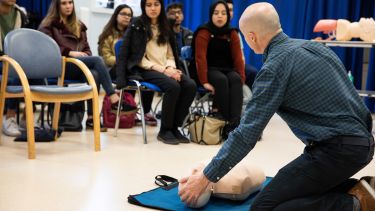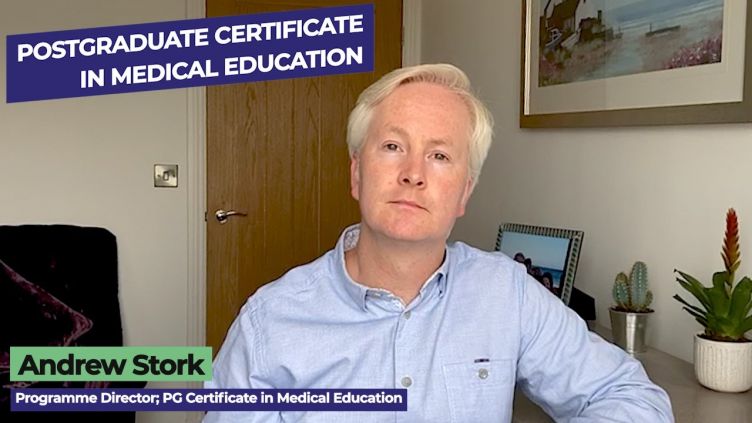Explore this course:
Medical Education
School of Medicine and Population Health,
Faculty of Health

Course description
This course gives healthcare professionals the opportunity to connect the theoretical principles of effective learning and teaching with their practice as educators. It is designed to enable you to fit your studies around your professional commitments.
You will study key concepts in learning, teaching, assessment and curriculum – for example, how to design and facilitate effective learning – beginning with more managed settings such as lectures, seminars, skills-based sessions and one-to-one tutorials. You will then learn how to develop safe, effective and sustainable learning in your workplace, focussing on helping your learners effectively integrate and participate in the clinical setting, become independent practitioners and develop their skills.
In the final part of the course, you will evaluate an area of a curriculum you are familiar with and propose ways to improve it. The learning focuses on what a curriculum is, frameworks for its design, how to evaluate it, the role of assessment and the influence of policy.
The University of Sheffield is a leading centre for medical education and you will be taught by a highly experienced, multi-disciplinary team.
Applications
This course has limited capacity, and we review applications on a first-come, first-served basis. This means that we may have filled all our places before the advertised application deadline.
Accreditation
Accredited by the Academy of Medical Educators
Modules
The course consists of three 20-credit modules. Each module includes two study days. During the two study days, the core elements of the module will be explored, with examples from practice used to illustrate key components. Each participant will be expected to participate in approximately eight weeks of online activity.
Core modules:
- Effective Learning and Teaching
-
This module focuses on how to design and facilitate effective learning, particularly within more 'managed' settings, for example in lectures, seminars, skills-based sessions and one-to-one tutorials. Through two face-to-face study days and online learning, students are introduced to a range of practical and theoretical concepts. These concepts inform students, for example, on how to write effective learning outcomes, how to create teaching sessions which reflect particular types of learning, and how to choose appropriate learning, teaching and assessment activities. Students take part in tutor and student-led sessions, developing knowledge and skills which are transferable to their own practice and context.
20 credits - Work Based Learning
-
This module focuses on how to develop effective learning in workplace settings. Through two face-to-face study days and online learning, students are introduced to a range of practical and theoretical concepts. These concepts inform students, for example, on how to help their learners effectively integrate and participate in the workplace, assist learners to become progressively independent and support their skill development. Students will also consider how to ensure learning is safe, effective and sustainable. Students take part in tutor and student-led sessions, which involve developing a work-based learning and teaching plan for their specific workplace setting.
20 credits - Curriculum Design and Development
-
This module focuses on how to use curriculum design and development concepts to evaluate part of a curriculum. Through two face-to-face study days and online learning, students are introduced to a range of practical and theoretical concepts. These concepts inform students, for example, on what a curriculum is, widely used frameworks for the design and evaluation of medical curricula, and the role of assessment. Students will also consider how policy influences curriculum design and development. Students take part in tutor and student-led sessions, which involve evaluating areas of curriculum relevant to their practice and propose ways to improve them.
20 credits
The content of our courses is reviewed annually to make sure it's up-to-date and relevant. Individual modules are occasionally updated or withdrawn. This is in response to discoveries through our world-leading research; funding changes; professional accreditation requirements; student or employer feedback; outcomes of reviews; and variations in staff or student numbers. In the event of any change we'll consult and inform students in good time and take reasonable steps to minimise disruption.
Duration
1 year part-time
Teaching
Each module includes two study days. You will also be taught through practical activities, online discussions and independent study.
Assessment
Each module is assessed through written submissions.
Your career
Our graduates have gone on to a wide range of roles in medical and healthcare education, training and supervision. These include senior management roles such as NHS Training Director and Armed Forces Training Commander, as well as academic positions in higher education. They work in many healthcare settings including the NHS, private healthcare and universities around the world.
Student profiles
Entry requirements
You will need:
- a recognised degree in a healthcare profession and
- experience in teaching or supervising learning in a healthcare or related setting and
- access to learners in a healthcare or related setting
English language requirements
IELTS 7.5 (with 7 in each component) or University equivalent.
As this course is taught part-time, it is not open to applicants who require a visa to study in the UK.
If you have any questions about entry requirements, please contact the school/department.
Fees and funding
Apply
You can apply now using our Postgraduate Online Application form. It's a quick and easy process.
The course will close on 1 July 2025.
Any supervisors and research areas listed are indicative and may change before the start of the course.
Recognition of professional qualifications: from 1 January 2021, in order to have any UK professional qualifications recognised for work in an EU country across a number of regulated and other professions you need to apply to the host country for recognition. Read information from the UK government and the EU Regulated Professions Database.






